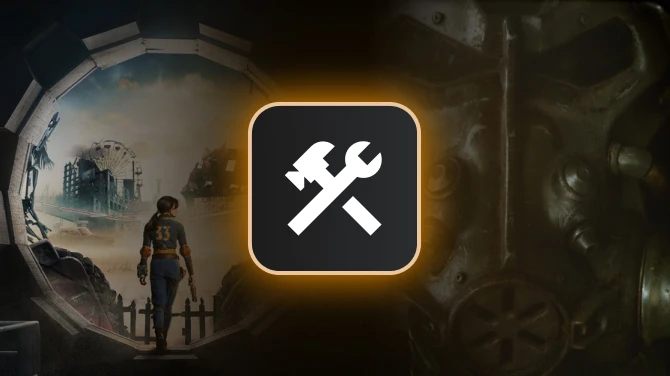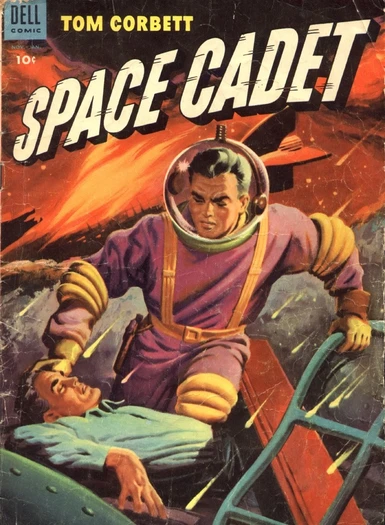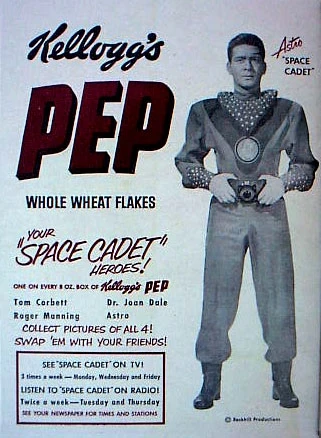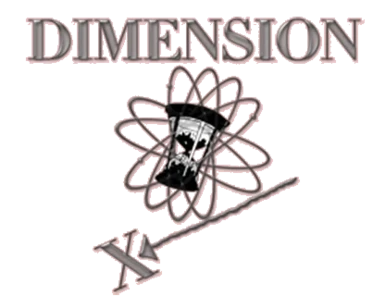About this mod
Adds several 50s radio stations, with an emphasis on lesser-known shows. Audio carefully edited and remastered from the best available sources.
- Requirements
- Permissions and credits
- Changelogs
- Donations
Adds several 50s radio stations, with an emphasis on lesser-known shows. Current focus is sci-fi.
- Over 100 hours of old 50s radio shows, spread across four new stations.
- Multiple sources scoured for the best possible recordings.
- Almost every track remastered to some extent.
- Intros and outros kept intact, with the option to disable.
- Programs optionally play in their original chronological order.
- No expurgation! Shows are provided as close to intact as can be, with no episodes arbitrarily cut.
The Stations:
Dimension X - This was the precursor to the well-known X Minus One radio show, and the two shows share a lot of DNA. Stories were written by familiar names such as Isaac Asimov, Ray Bradbury, Robert A. Heinlein, Kurt Vonnegut et al. It aired from April 8, 1950 to September 29, 1951. 50 shows were produced, and all 50 are able to be provided. Audio quality of most episodes is good.
Exploring Tomorrow - A much lesser-known radio show which aired from December 4, 1957 to June 13, 1958. Similar in scope and material to Dimension X and X Minus One, though with newer material. Provided in the interest of variety. Out of 29 known episodes, 24 made the cut for inclusion. Audio quality of individual episodes ranges from fair to good.
Tom Corbett, Space Cadet - A show which began life on TV, based on Robert A. Heinlein's novel Space Cadet. Developed for a younger audience, similar to the familiar Space Patrol radio show, which Tom Corbett slightly predates. It aired from January 1 to June 26, 1952. Stories were almost always two-parters split across two episodes for added suspense. Out of 51 known episodes, 43 made the cut. Audio quality of individual episodes ranges from fair to good.
X Minus One - Everyone knows about this show. It can be heard in two preexisting mods: Old World Radio and X-1 Tales of Wonder! The former offers the first 25 episodes, and the latter offers a curated assortment of 51 episodes. There are three reasons for the show's inclusion here.
- First and foremost, there were 125 episodes of X Minus One produced in total. The goal of this radio mod is to provide something as close to the original broadcasts as can be achieved (although also with an eye to reaching parity with other New Vegas radio stations). This means no arbitrary exclusion of any given episode, if at all possible. Out of those 125 episodes, 121 survive, and all 121 are provided here.
- Second, nowadays there are modestly better recordings of X Minus One available. (Or significantly better, depending on which preexisting mod we're comparing against.) The best one could originally get seems to have capped out at about 8.5KHz, but resources today reach up to 15KHz, and this improvement can be heard.
- Lastly, the improved resources also include the "intro" and "outro" components of the broadcasts (discussed below), and these are provided intact for the first time.
Audio Quality and Remastering:
The overwhelming bulk of the effort which went into this project was spent preparing and remastering the individual audio files. With the modest exception of X Minus One, the shows included in this mod are all of somewhat lesser audio quality than is typical of radio mods, and this likely contributed to the fact that most of them have not made an appearance in a mod yet.
The two main targets for "solving" when it came to these shows were: Hum, and general background noise. The issue of noise (hiss or low frequency "wind") is multifaceted, and in many cases it was actually just part of the broadcast to begin with, since the budgets for these shows weren't necessarily always generous. The noise I made efforts to target was of the sort one would expect as an effect of recording these broadcasts to tape. So artifacts that were part of the broadcasts—especially the crackle of vinyl, as prerecorded sequences tended to be sourced from LPs in the studio—were more or less ignored by preference.
Hum is another matter. Hum was scoured from every recording and mercilessly wiped out. But carefully, so as not to compromise the intended sound.
A third facet that was tackled as necessary was the issue of harshness of sound. Quite a number of episodes were a significant earsore before care was provided to make them listenable.
What could not be addressed was the fact that in many cases, the best sources for these shows were sub-standard MP3 encodings. 32kbps, for example. Only so much can be done about encoding artifacts. The trend here is that the more well-known a given show was, the more likely it was to be available in acceptably good quality, and that goes double for the quality used to encode them digitally. Also of some concern were the occasional signs of an obvious preexisting effort to digitally clean up the audio. Such efforts were worked around as needed.
A few episodes of most shows—notwithstanding my efforts to track down all available sources—seemingly only exist as recordings with excessive tape dropouts, compromising the ability to even understand what is going on. A further handful of episodes were either far too clipped or too lacking in available frequency range to be tolerable and lucid. Such episodes were begrudgingly selected for exclusion.
Although the audio quality of a typical episode in these radio shows is lower than that of a studio-recorded album, this is frankly part of the appeal of listening to an old radio show. My remastering efforts bring things a little closer to parity with what people may be used to, but by no means did I take a thorough approach and aim for a perfectly clean broadcast. (Even though the result was often very close.)
Intros and Outros:
Most of the recordings available today for these radio shows include the complete broadcast. Broadcasts often began with some preamble: news reports, advertisements, etc. And they very typically concluded with things like program credits, previews, the broadcast station's signature tone, etc. To the best of my knowledge, no radio mod in the same vein has chosen to include these elements. Probably because they were not available at the time.
In the interest of maintaining the sense of listening in on actual broadcasts from back in the day, these intro/outro elements have been preserved. But it is understood that not everyone may have an interest in repeatedly hearing opening/closing spiels that were meant to be heard once per day at most, so the option to disable these elements is provided in the configuration file.
Configuration Settings:
- Radio station naming convention can optionally add a prefix to each station's name so they can remain sorted together.
- Each station can be disabled individually.
- Intros can be disabled. (Default: Intros are enabled.)
- Outros can be disabled. (Default: Outros are enabled.)
- Radio stations can play in their original broadcast chronology, as opposed to randomly. (Default: Enabled—programs play chronologically.)
- Certain episodes that exhibit lower quality audio can be optionally disabled.
- X Minus One episodes which already appeared in Old World Radio can be disabled.
- X Minus One episodes which already appeared in X-1 Tales of Wonder! can be disabled.
Caveat:
As one might reasonably expect, I have not personally listened to all 100+ hours of every show. That day is unlikely to come anytime soon. I am already quite prepared to encounter anomalies with individual episodes which will need addressing, such as further cases that exhibit harshness of sound which could use a little toning down, or episodes whose volume could stand for a little rebalancing. I know of one episode which possessed over a hundred MP3 "blips" (encoding artifacts which audibly manifest as brief, startling, musical beeps), and although I solved the majority of the blips, I never gave the episode a complete listen, so it will likely demand a revisit.
The mod itself is also not thoroughly tested. This is a pre-release. Problems could happen.
A Note About Repeat Stories:
Between Dimension X and X Minus one, there are several stories which get re-dramatized. Sometimes even within the same radio show. I was tempted to toss in configuration flags that would exclude repeats, but the fact of the matter is I don't know how distracting this will really prove, over the course of some 70+ hours of listening. I also don't yet know which of the repeated dramatizations are the ones to favor, on account of not having listened to them myself. And there are other complications, such as the possibility that even if someone has already heard a given story on a preexisting X Minus One radio mod, they may yet glean some entertainment out of hearing a different iteration from an earlier show.
My final choice was no choice—I'm leaving these shows intact, the way they were broadcast. If this ends up being a poor decision, that will eventually become obvious and I can make a change at that time.
Behind the Scenes:
The impetus for the creation of this mod was severalfold. At the top of the list was the recent brouhaha over my King's School of Impersonation Radio Replacer mod, which was briefly forced down until a compromise could be reached on what it was intended to offer. I decided that if I was going to be tinkering with radios anyway, I may as well develop something that was less open to such measures.
Secondly, the fact of the matter is that over the span of thousands of hours of playthroughs, I've pretty much exhausted what FNV's existing radio mods have to offer. It didn't take me long to determine that there were untapped resources I could plumb for new material.
And finally, the matter of audio quality. When it comes to this topic, it is an itch that I unfortunately must scratch. I can't knowingly release something with audio components that I know to be less than ideal. Heavily influencing this part of the process is the fact that I identified the audio quality in preexisting mods to be relatively poor. I get the reasoning behind limiting file sizes when dealing with hours and hours of sound, but my personal take is that we can afford the space for a little extra quality. That said, even the quality settings I settled upon are a minor compromise between final quality and HDD footprint.
The initial idea for this mod was to create something that provided a truly exhaustive bulk of material. I was intending to provide a dozen stations, each as complete as the four which I settled upon. But the workload for my ultimately reduced endeavor already proved extreme. 100 hours will have to do for now. It's time to bring the rest of my mods up to date and get my playthrough going.
Thanks:
EPDGaffney for general radio modding advice and listening to me gripe about the timesink.
Legal:
Every single second of audio in this mod is in the public domain.












